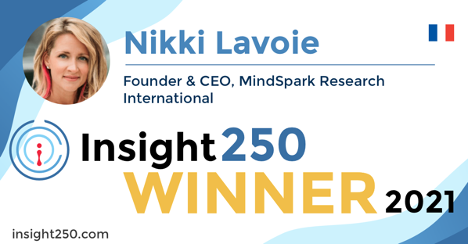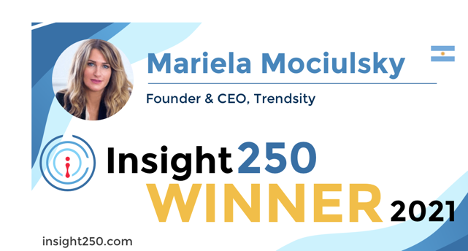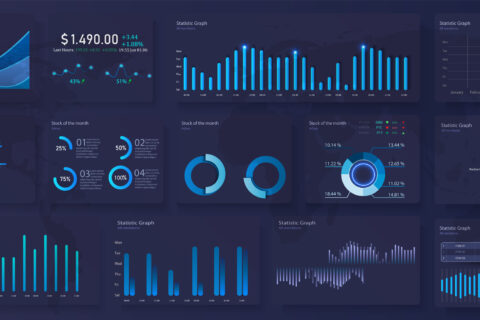


The Insight250 spotlights and celebrates 250 of the world’s premier leaders and innovators in market research, consumer insights and data-driven marketing. The inaugural list was revealed this April and created renewed excitement across the industry whilst strengthening the connectivity of the market research community.
With so many exceptional professionals named to the Insight250 it seems fitting to tap into their expertise and unique perspectives across an array of topics. This weekly series does just that; inquiring about the expert perspectives of many of these individuals in a series of short topical features.
This edition features two pioneering research experts who deliver solutions to an array of clients, Mariela Mociulsky, Founder and CEO of Trendsity and Nikki Lavoie, Founder and CEO of Mindspark and Vice-President of ESOMAR.
With consumers becoming increasingly savvy and markets becoming increasingly complex, Nikki and Mariela are on the frontline of how to deeply understand and effectively motivate consumers. Here they share their expertise on how to innovate to deliver to clients/enterprises.
Crispin: What do you find is the most significant data-driven need that brands have in today’s market?
Nikki: “There are so many, but I think the most significant need today is the need for connection. It isn’t enough to understand people, but developing rapport has become so much more important as people decide which brand relationships to maintain, and which mean less to them. Interestingly, this has long been thought of as a “non data-driven” need, but data does, in fact, play an important role here. There is so much to be observed about people that can help us understand their lives, not just their product or marketing needs, and can create the genuine connection that drives brand longevity.”
Mariela: “Brands face a changing context and an increasingly informed and demanding consumer; and, in this sense, the brand’s response must be specified in increasingly pressing time frames. In this way, access to digital payments, e-commerce, delivery through shipping apps, digital price comparison tools, social network communication and omni-channel flow together to streamline the consumer’s decision.
“It has never been so central for companies to satisfy their customers. Nowadays, brands are increasingly needing to anticipate, and learn more about consumer trends, and for this reason, a multidimensional analysis is fundamental. Consumer understanding is achieved not only through detailed observations, but above all, through the analysis of their motivations, behaviours, tensions and contradictions, which is possible with explanations offered by disciplines such as psychology, anthropology, sociology, statistics and neurology, among others.”
Crispin: What is the biggest challenge market research agencies have in supporting clients?
Mariela: “Given the maturity of the digital era, where consumers have the power to express themselves, give their opinions, build and destroy brands and company reputations without any intermediary, it is worth asking what is the role of the insights and market research industry.
The 20th century models have ceased to be effective and, in the 21st century, focusing on the customer at the center of the business strategy has become the key to success. The purpose of consumer knowledge has always been to explore and get to know people’s lives: how they live, their routines, their likes and dislikes, opinions, attitudes, beliefs and behaviours; in other words, to decode their underlying desires.
“In the new digital era, the sources from which information can be obtained spontaneously and in real time are increasing. In a context where the big data paradigm prevails, it is possible to get an almost infinite amount of data. However, the complexity generated by measuring the effectiveness of contents means that one of the most important and relevant areas of work is data curation. This is where the training of researchers is required to include knowledge of emerging technologies and methodologies, the development of consulting skills to collaborate in decision making, and therefore contribute to the needs of the business.
It is about a more wide-ranging approach to our discipline; the added value comes from a better alignment with the technological context and a more comprehensive and holistic perspective of clients’ needs. The ability to integrate, interpret, curate and strategically understand the business is a challenging task, clearly human and difficult to replace by AI.”
Nikki: “I’d say the biggest challenge agencies face these days is the constant push for more research to be done internally. Agencies must not only adapt to smaller budgets needing to go further, but they also must learn to have partnerships with them that feel like internal partnerships. Smoother rides, fewer delays, and time spent (independently, if necessary) understanding clients’ brands, products and business structures. We need to be extensions of client teams, not simply a resource for one.”
Crispin: What do you believe is the greatest competitive advantage a brand can leverage through its data?
Nikki: “The brands who will succeed in these changing times are the ones who are willing to meet consumers where they are – both in terms of data collection, and in terms of their evolving need set. It isn’t only about the type of data you have, but how you get it. Those brands who recognise that the customer comes first – not the methodology – will have the power to adapt their data collection methods and continue to understand their customers, while others see a decrease in consumer knowledge.”
Mariela: “Nowadays we need more human-centric brands and brands must triangulate their business model, articulating: consumer interests, time values, strategic vision of the company/brand with growing consumer demands. The accelerated growth in the amount of data, and the preference for the immediacy of feedback as well as the possibility of continuous tracking encouraged the creation and expectation of “instant Insights.”
“The development of technology allows brands to take advantage of their data, however, they have to give it sense and strategic analysis for their business. This requires the integration and interpretation of data in a social, cultural and conjunctural context in order to achieve a goal. There are multiple opportunities for brands, including learning more about the customer (their interests, socio-demographic characteristics, where they live, habits and preferences, etc.), improving the user experience, co-creating with the customer improvements or new designs, tracking their level of satisfaction, knowing the impact of their communications, going deeper into their main interests or challenges and understanding their customer’s journey. In order to achieve this, it is necessary to constantly create and test new approaches linked with technology to understand people’s attitudes towards certain products and services.
And also, to be more agile and more flexible, to connect with and learn from other disciplines related to knowledge and innovation.”
Crispin: Which do you feel delivers greater strategic value, internal or third party data and why?
Mariela: “Increasingly, our discipline requires a more “ad hoc” approach. With the rising amount of multidisciplinary sources of information, it is necessary to analyse and design each research “tailor-made” for what we want to know. Data can be collected using a qualitative or quantitative approach, from internal or external sources, but the method of analysis must include a deep and holistic reading that enables us to make the numbers “speak,” give them meaning and contribute to an actionable decision making process.”
“As researchers, our added value should be more and more focused on compensation for the diversity of data sources and new tools through experience and integration. Becoming data “curators,” understanding that the complementary of different sources of information will be increasingly relevant when contextualising, interpreting, decoding and comparing data.”
“In a world where real-time data about what the consumer actually does is becoming easier and easier to collect, there is an opportunity for the research community to be the generator of high value-added knowledge from this data and to integrate it and enliven it with other sources of information. The challenge will be to have a deeper knowledge of all the tools that make it possible.”
Nikki: “It’s hard to give differing weight to these two data sources, as they both (can) have significant strategic value. That said, I think a lot of people question the objectivity of internal data and subsequently dismiss its value. On the contrary, internal data – when collected carefully and analysed in context – has the power to speak more clearly to stakeholders and thus drive more meaningful organisational change.”
Crispin: HOT TOPIC: Sustainability. There’s more and more talk about sustainability – is this a hot topic in Argentina/France and how is your business responding?
Nikki: “Sustainability is a huge topic in France – more and more major corporations are starting to think about holding their investments in sustainability-focus funds, and trying to understand how they can rise to meet increasing consumer demand for sustainable products and services. The French government is taking significant measures to ensure that businesses across all sectors are moving towards greater ecological consciousness, and I can only hope it’s not too late!”
Mariela: “Sustainability is a worldwide sizzling topic and Argentina is no exception: the concern for both, the care of the planet and social equity, grows in all measurements we make among consumers. We are assuming our responsibility as consumers, although there are different segments with different levels of commitment regarding the actions that each one can carry out. More involvement is required from companies and governments, and brands are taking note of these demands. From Trendsity, we conduct research on these themes to collaborate with information and solutions to brands intentions. Trendsity are seeking certification as a B Corp. The B System is a non profit organisation that looks for the evolution of the current economy and market, towards an inclusive, equitable and regenerative model, using market force to solve social and environmental problems. In this way, we join the initiatives of a group of companies that not only pursue economic benefit but also a common purpose. As B Corporations and as their protagonists, we commit ourselves personally, institutionally and legally to make our decisions considering the long term consequences for the community and the environment.
In this context, we join a way of working according to an economy that can create integral value for the World and for the Earth, promoting economic organisation that can be simultaneously measured from the well-being of people, societies and the planet, taking into account short and long term considerations.”
TOP TIPS
Mariela: “I believe that the most important challenge for researchers, as for most professions, will be to evolve in tune with society’s digital progress; to add, create and articulate new methodologies and approaches, and integrate us with other data and information producers. We must be able to ensure that research methods are reliable, ethical and aligned with our business customers’ needs by working as partners. Business models are changing, all industries are resignifying themselves. The knowledge we provide enables decision-making in the pursuit of brand growth. In a world where many of the variables that socially constituted us change, the ability to anticipate, clarify, deepen and reduce uncertainty will be increasingly part of our task. If we are able to provide not only adequate answers but better questions in a saturated context by the information access, we will be authentic information curators: a generating tool of concrete business value.“
Nikki: “My top tip would be to never lose sight of the value of human connection; conversations with people are still data, and oftentimes are the most powerful forms of it.”


